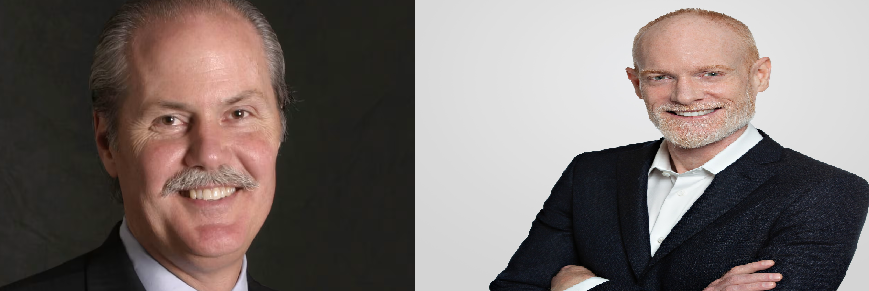
School choice champions Chip Mellor, left, and Caleb Offley, each died last week.
Sad news this week: Two great warriors for education choice, Institute for Justice co-founder Chip Mellor and the Walton Family Foundation’s Caleb Offley, died on the same day. The Wall Street Journal wrote a memorial for Mellor here which reads in part:
Many young lawyers hope for careers in which they can use the law to promote justice and change lives, but few succeed. One who did was William “Chip” Mellor, who died Friday at 73 years old.
Myles Mendoza and Jason Gaulden wrote tribute to Offley, which read in part:
Caleb made a significant and lasting contribution to the field of education philanthropy, and his impact will continue to shape the lives of the many leaders he supported for years to come.
His approach was always selfless and humble. He worked quietly behind the scenes. Caleb never sought the spotlight. Instead, he was deeply committed to elevating others, believing that real leaders don’t care about followers; real leaders care about developing other leaders. That’s exactly what Caleb did throughout his life.
If there were a School Choice Valhalla presided over by Milton Friedman, Valkyries would be depositing Chip and Caleb into the hallowed halls for a rip-roaring celebration and feast. Well done gentlemen- may your memories be a blessing for us to treasure and your lives examples for us to follow.


The VELA Foundation offers Bramblewood Academy, a hybrid co-op located on a farm in Hilltown, Pennsylvania, as an example of “unconventional education.” Bramblewood offers a mix of project-based learning, Socratic discussions, and real-world activities, maintaining flexibility with programs that run from two to five days a week. Parents are not expected to be teachers, but they are encouraged to volunteer to receive a nearly 50% tuition discount.
Editor’s note: This commentary from Bruno V. Manno, senior advisor for the Walton Family Foundation education program, is an exclusive to reimaginED. The Foundation provides support to VELA Education Fund, mentioned in this piece.
Many stories about COVID-19 describe its damaging effects on K-12 education, from closing schools to enrollment declines to student emotional problems and learning loss. These stories are true and should be told.
But so should another group of stories -- hopeful ones -- that describe how K-12 civic entrepreneurs in America’s communities are creating new learning opportunities for families and their children. These everyday grassroots entrepreneurs are creating a new unconventional K-12 education sector through permissionless innovation.
Here are three features of that approach.
First, these entrepreneurs want to change things, and, typically, do not ask permission from regulatory agencies to start their ventures. When they deal with bureaucracy, they curb its suffocating effects.
Second, families enroll their children in these innovative programs because they are accommodating and meeting the new learning needs of families following the pandemic.
Third, these entrepreneurs believe their ventures are adding unique value to people’s lives by creating what I call a new K-12 sector of unconventional learning opportunities. Their programs are flexible and tailored to student needs compared to the traditional K-12 system.
In short, the maxim of these K-12 civic entrepreneurs goes something like this: “Just do it. They will come. And together, we can create something new and valuable.”
A recent report from VELA Education Fund describes these new ventures. It is not a scientific sample of these programs, so we cannot draw general conclusions that apply to all types of new learning ventures. But the results are like what pollsters find in focus groups. They provide general themes and other information that offer insights into an emerging sector of new K-12 learning environments.
The Fund surveyed leaders of 801 new learning ventures outside the traditional K-12 public and private school systems that received $7.5 million in VELA support since 2019. It received 413 responses from these leaders who founded new learning models that include microschools, virtual schools, pods, homeschool coops and programs, hybrid homeschools, and private schools. More than half (54%) are microschools or homeschool coops.
Here is what we are learning about these community enterprises.
The ventures
These ventures are young in their organizational lifecycle. At the time of their first VELA grant, more than 7 in 10 (72%) were three or less years old, with 3 in 10 (30%) less than one year old.
A majority (56%) are nonprofits, almost 3 in 10 (28%) for-profits, and the rest intend to incorporate as nonprofits. Nearly all of them (95%) have plans to grow.
Only 10% own their own space, with the rest renting space from faith organizations, corporate or individual private space, and public space like libraries or schools.
Their families
These ventures are not only for affluent families. Many have a core focus serving low income or historically underserved families. Almost 4 in 10 (38%) do this, while over 9 in 10 (93%) serve some portion of these groups.
Their finances
These ventures receive minimal external funding, with over 7 in 10 (73%) receiving 2022 external support only from their VELA grant and only 1 in 10 (10%) accessing public dollars. Over 8 in 10 (84%) charge tuition and fees or sell products and services, with 7 in 10 (70%) using tuition and fees as primary revenue sources.
Families receive discounts, scholarships, and reduced or free services. Some organizations have subscription fees or membership dues. They also use sliding income scales to determine a family contribution and are willing to exchange goods or services rather than receive an actual dollar payment.
So, grassroots K-12 civic entrepreneurs are creating a new sector of unconventional learning opportunities for families and young people. Permissionless innovation is the best way to describe their approach.
To summarize:
The permissionless innovation of grassroots civic entrepreneurs at the heart of this dynamism is creating new K-12 sector of community learning options to help young people flourish as adults. K-12 stakeholders and other community leaders should support these ventures and the families that use them.
When he first came on the scene, he was in and out of prison, recording freestyles with his cousins in Southern California. But more than two decades after he first made it big, parents no longer fear him. He's at home in Katy Perry videos and Old Navy commercials.
In this way, longtime school choice advocate Howard Fuller said Snoop Dogg's trajectory parallels that of charter schools, which celebrated their 25th birthday this week during a national conference in Nashville. In the late '80s and early '90s, it may have been hard to imagine them breaking into the establishment, but now, for all the political battles they face, they've become entrenched.
"We're heading towards being mainstream," Fuller said during a discussion of what the charter movement can expect at future big anniversary celebrations. "I hope there's someone out there, selling mixtapes out of the back of their car."
In Florida, there are still educators launching innovative, inner-city startup schools on shoe-string budgets, from Orlando to Overtown. But in many cases, they aren't starting charter schools. They're starting private schools where students rely on school choice scholarships to cover tuition. The barriers to opening a new charter school are getting higher. Startup funding is harder to come by. While they get less funding per student than charters, these private schools are constrained by fewer regulations.
Fuller said charter schools need an "innovation strategy" that embraces entrepreneurial educators looking to break free from conventional schooling models. In that vein, he added, the school choice movement needs to think about all three sectors of public education — four if you count homeschooling — and how they fit together.
(Fuller also gave an opening speech that brought the house down, in which he called for the movement to refocus its energies on "the poor, disinherited, and dispossessed.")
Philanthropy only goes so far
The Walton Family Foundation decided to give charters a massive anniversary gift: $250 million for school facilities.
In a speech announcing the Building Equity Initiative, Marc Sternberg, the foundation's K-12 program director, said the foundation wants to help educators worry less about real estate, so they can focus on the classroom. Eventually, it hopes to create space in high-performing charter schools for 250,000 more students. (more…)
How can Florida attract highly regarded charter schools outfits like Rocketship and Yes Prep? Some of the state’s top education leaders hope to figure that out as they begin looking more closely at why those high-impact schools aren’t in Florida now.
“We need to do a better job, in my opinion as the state Board of Education chair, of serving our neediest children,’’ Gary Chartrand told redefinED Tuesday. “We need charter school operators that are really serious, cause-minded folks ready to do the hard, hard work of working in the toughest neighborhoods.”
Chartrand joined Gov. Rick Scott and Florida’s school choice director, Mike Kooi, in Orlando on Friday for a meeting with five of the country’s leading charter school operators (KIPP, Yes Prep, The Seed Foundation, Rocketship Education and Scholar Academies) and five superintendents from the state’s largest school districts (Orange, Miami-Dade, Duval, Hillsborough and Pinellas counties).
The group also included representatives from the Walton Family Foundation and the Florida Philanthropic Network, which includes the Helios Education Foundation and the Bill & Melinda Gates Foundation, Chartrand said.
The goal: identify the roadblocks for such schools and work toward solutions. There are a lot of variables, including per-pupil funding, which Chartrand said presents a significant challenge.
Florida ranks near the bottom nationwide, with an average of $9,572 spent per pupil, according to a recent Education Week analysis. By comparison, Vermont spends $18,924 per pupil and Utah $7,042.
“It does cost more to serve the highest-needs areas,’’ Chartrand said.
Chartrand helped bring KIPP to Florida and serves on the board of directors for the Jacksonville school (Chartrand donated $1 million toward the middle school and helped raise $9 million from the local business community). KIPP offers a longer school day and year, after-school programs and highly-qualified instructors to teach an academic program that focuses on college prep and character development.
Since KIPP was founded in 1994, more than 90 percent of its students have graduated high school and more than 80 percent have attended college. Of those, 40 percent have obtained college degrees.
The state wants to lure similar schools “by making long-term sustainability … a reality,’’ Chartrand said.
That might mean reducing startup costs, he said, perhaps by giving the schools access to the state’s Charter School Growth Fund. The fund is a $30 million reservoir created by federal Race to the Top dollars and philanthropic groups to benefit high-performing charters serving low-income students.
Another way to help is to streamline the charter school authorization process, Chartrand said.
In Florida, where there is no state authorizer, charter school operators apply through individual districts. But the process could go smoother if districts, state school choice officials and charter operators collaborate more closely on the front end, he said.
Texas: The State Board of Education votes to urge lawmakers to reject school vouchers - or any other mechanisms that reduce funding to public schools (Texas Tribune). Orthodox Jews, Catholics and leaders of other religious groups joined forces with private school advocates to rally for tax credit scholarships(The Yeshiva World News).
California: L.A. mayoral candidate Wendy Greuel, who wants to be the "education-reform mayor,'' supports parent trigger and other reform measures (Los Angeles Times). More from the Huffington Post.
 Colorado: The Senate approves a bill that adds $1 million for charter school construction (Associated Press).
Colorado: The Senate approves a bill that adds $1 million for charter school construction (Associated Press).
Washington, D.C.: Former students and faculty of Sidwell Friends, the elite private school that has educated children of presidents and members of Congress, want to open a charter school - and have Sidwell's support (The Washington Post). A report by the Walton Family Foundation shows the District's charter schools received about $13,000 less in per-student funding in 2011-12 than traditional public schools (Washington Examiner).
Pennsylvania: Philadelphia is the latest city to rally for school choice with more than 200 parents, educators and other charter supporters demanding district officials allow the expansion of at least 20 charter schools (NewsWorks). Also, the city's Mayor Michael Nutter asks the governor to approve more funding for city schools, including reimbursing districts for dollars spent on charter schools (NewsWorks).
Florida: Facing a tuition crisis, Jewish day school educators and religious leaders lobby Tallahassee for expanded school choice (Lubavitch.com). Lawmakers are trying to give district schools some of the same flexibility as charters, but still within union agreements (redefinED). This charter school almost didn't happen - and now it's one of the leading science schools in the state (redefinED).
Louisiana: New Orleans school officials consider an enrollment plan that, eventually, will allow some charters to hold seats for students who fit the school's mission - like a military academy. Opponents worry it will lead to cherry-picking high-achievers (The Lens). State Rep. Katrina Jackson has proposed a bill to allow public school students to recite the Lord's Prayer and Pledge of Allegiance (KATC). Former Secretary of State Condoleezza Rice touts Gov. Bobby Jindal's efforts to reform Louisiana's schools (The Times-Picayune). (more…)
Texas: Sen. Dan Patrick's school choice bill makes an ambitious attempt to expand charter schools, lifting the statewide cap on the number of charters and requiring school districts to sell or lease underutilized classrooms or other facilties to charter operators (The Texas Tribune). More on the bill, including possible concessions by Patrick on the charter cap ( American-Statesman). Patrick cries in committee as he advocates expansion of school choice (Associated Press).
 Louisiana: A $5 million federal training program offers $50,000 grants to teachers to help turn around failing schools. The program will serve either as a stop-gap while more charter schools ramp up to provide students with better learning options, or as an alternative approach to fix a failing system with the selected district schools operating similar to charters (Education News). A mother's struggle to find a quality school for her sons points to a key failure in New Orleans’ lauded choice-based system: options abound, but they're not always reputable ones (The Lens).
Louisiana: A $5 million federal training program offers $50,000 grants to teachers to help turn around failing schools. The program will serve either as a stop-gap while more charter schools ramp up to provide students with better learning options, or as an alternative approach to fix a failing system with the selected district schools operating similar to charters (Education News). A mother's struggle to find a quality school for her sons points to a key failure in New Orleans’ lauded choice-based system: options abound, but they're not always reputable ones (The Lens).
Arkansas: A Senate committee votes down a proposal for a tax credit scholarship program (Associated Press).
Florida: A parent trigger bill clears a third House committee and heads for a House floor vote (redefinED). Charter school lobbyists focus this legislative session on winning state money for maintenance and facilities, or, the right to use empty space in traditional public schools free of charge (Tampa Bay Times).
Tennessee: A voucher bill forwarded as a broader alternative to Gov. Bill Haslam's proposal is withdrawn (Associated Press). But the debate continues over how many children the program should serve (Memphis Commercial Appeal). Pressed with the need for charter operators in his district, one state lawmaker is considering a proposal to allow for-profit charters; Rep. John DeBerry says the idea is to help well-meaning operators with the business-side of running charter schools (The Tennessean). The Walton Family Foundation is investing $1 million to help create four new charter schools in Memphis (Memphis Business Journal).
Georgia: A parent trigger bill is pulled amidst concerns from Republican lawmakers (Atlanta Journal Constitution). Proposed legislation could force school districts to consider parent petitions to turn non-failing public schools into charters (Atlanta Journal-Constitution). A proposal to expand the state's tax credit scholarship program clears a key House committee (Atlanta Journal Constitution). (more…)
Vouchers need more accountability. So say David R. Colburn, director of the Askew Institute at the University of Florida, and Brian Dassler, chief academic officer for the New Orleans Center for Creative Arts, in this exclusive op-ed for the Tampa Bay Times. Response here from the Heartland Institute, which says parental satisfaction is “a more effective form of accountability than extending mindless bureaucratic oversight to the private sector.”
New charter school to focus on “Latin and logic.” Tampa Bay Times story here. The applicant for the school is Anne Corcoran, the wife of state Rep. Richard Corcoran. He’s a future House speaker and a strong proponent of private school choice, too.
Threats to single-gender learning options. U.S. Sens. Kay Bailey Hutchison and Barbara Mikulski are considered to be on opposite ends of the political spectrum, but in this op-ed for the Wall Street Journal they unite in defense of single-gender options in public schools. (They single out Florida as one of the states where such options have been under legal fire.) It’s worth noting that in our own backyard, old lines of division have also faded over this issue. Last year, John Kirtley, who chairs Step Up For Students, donated $100,000 to the Hillsborough County School District to support single-gender academies at two public middle schools. The Walton Family Foundation kicked in another $100,000.
More on race-based achievement goals. The New York Times writes today about the state Board of Education’s decision last week to set different academic achievement targets for black, white, Hispanic and other subgroups. The targets incorporate steeper rates of improvement for groups with lower proficiency rates, but they have nonetheless caused a ruckus. The parents group Fund Education Now weighs in. So does Naples Daily News columnist Brent Batten, who hears from Collier County education officials that this is “much ado about nothing.”
Editor’s note: Washington state is one of only nine states that don’t have charter schools. But voters can change that in November if they approve Initiative 1240, which will allow up to 40 charters statewide over five years. Chris Eide, who heads a Seattle-based ed reform group called Teachers United, tells redefinED in this emailed Q&A that it’s the students who struggle the most who will benefit if voters say yes.
 This is the fourth time Washington voters will go to the polls to vote on charter schools. They said no the first three times. Why will this time be different?
This is the fourth time Washington voters will go to the polls to vote on charter schools. They said no the first three times. Why will this time be different?
The last time voters looked at the option of charter schools in our state was eight years ago. Over that time, we have been unable to significantly address the needs of our struggling students. Moreover, the families of those students are often without high-quality options that can adapt to and address the needs of their children. Additionally, over the past eight years, high-performing charter schools across the country have demonstrated success for struggling students. Families in 41 other states have this option now, and Washington voters are faced with an easy decision to help struggling students.
Why does Washington state need charter schools?
Like other states, Washington has had a difficult time addressing the needs of struggling students. In some schools, nearly 40 percent of students are dropping out and far too many who do graduate are not prepared for college or their career. Public charter schools would be an option that will allow those students and families to attend a school that might better address their needs. If we hope to have more of our students graduating high school prepared for life after K-12, we are going to need all of the high-quality options that we can get.
You pointed out in a recent Seattle Times column that Initiative 1240 will only allow high-performing charters. How is that defined? And why did you stress that distinction? (more…)
The most interesting comment I heard at this week’s American Federation for Children conference in Washington, D.C., came from Ed Kirby, who heads up projects at the Walton Family Foundation. After listening to GreatSchools CEO Bill Jackson and me talk about the information parents need to make good schooling choices, Ed said how rare it was to hear education reformers discuss improving the demand side of K-12 education. We tend to focus almost exclusively on improving schools and teachers (i.e., the suppliers), Ed remarked, and we ignore enhancing the capacity of parents to make good choices.
This is an important insight. In most sectors of our society we rely on consumers to inform and drive improvements in products and services, but that’s not true in publicly funded K-12 education. United States automakers didn’t invest in high quality small cars until American consumers started buying small cars from Japanese automakers. Microsoft is now investing heavily in online services because its customers are increasingly purchasing online services. The collective wisdom of consumers is the most valuable asset in our country, and yet we ignore this asset in K-12 education and then wonder why productivity in publicly funded education has remained stagnant.
Tenure reform, merit pay, increased funding, and more school choice will not significantly improve student learning if we don’t if give parents access to the information and support they need to make good choices. Ed is correct. Well informed parental empowerment is a necessary condition for improving K-12 education.